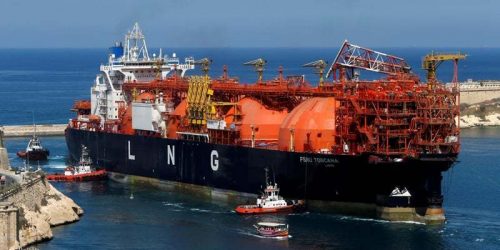ISLAMABAD: As foreign traders of liquefied natural gas (LNG) default on supplies amid gas shortages, the Cabinet Committee on Energy (CCoE) will meet here on Monday (today) to review the overall situation, including discontinuation of gas supplies to a large number of industries on a long-term basis.
Following reports that two state-owned foreign suppliers had declined to supply their two committed vessels for delivery in February, Pakistani authorities are reported to have salvaged at least one of the vessels through high-level diplomatic efforts. However, the government has confirmed that one vessel committed for the second half of February will no more be available as the successful bidder (ENOC of the United Arab Emirates) has defaulted.
“The second spot cargo, in the last week of February 2021, was awarded to the lowest bidder as per PPRA Rules, who conveyed inability to deliver as per its bid,” said a statement issued by the state-run Pakistan LNG Limited (PLL).
The LNG price in the spot market has become almost equal to that of crude — almost double the rate ENOC had committed to Pakistan through the lowest bid — about three weeks ago. The UAE’s state-run company also gave up its bid bond, leaving the authorities high and dry.
It said PLL had “approached the 2nd and 3rd lowest bidders within the bid validity period, all of whom regretted to deliver the cargo at the prices they had offered in their respective bids”. It attributed the default to volatile spot market, indirectly conceding the importance of long-term supply contracts the government has been criticising.
Informed sources said SOCAR Trading, a subsidiary of Azerbaijan’s state oil company, also faced problems in LNG supply in the second week of February, but strategic friendly relations did not let the supply go off. Also, a 2017 agreement with SOCAR for a possible long-term government-to-government cooperation came to PLL’s rescue, the sources said.
“This bid default of the suppliers is associated with the recent supply shortages leading to high price volatility in the spot market, coupled with extra buying in North Asia. There is news in the market about numerous global companies defaulting on their bids, or even contracts in some cases, given the supply shortages and extremely volatile prices,” the PLL said. However, it did not officially say if the SOCAR vessel was secured.
It said: “Suppliers who have regretted to supply after bidding in the PLL tender include state-run entities and major international LNG traders. PLL is taking all measures available under law and PLL’s tender process, including forfeiture of bid bonds, against the bidder(s) who failed to supply cargo as per their bids.”
PLL, however, said that February being a low demand month, Pakistan had imported 7.75 cargoes, on average, in the last four years while “at this time, a total of eight cargoes are secured”. The company said it was working with the respective users to reconfirm demand at the current prices and was exploring alternatives if demand for an additional cargo in February was reconfirmed.
This confirmed that spot LNG prices have already become unviable for major consumers. Beyond 17pc of Brent price, LNG becomes more expensive than furnace oil for power generation while ENOC had won the bid at 23.43pc of Brent ($11.70 per mmbtu) for delivery in the last week of February.
While the CCoE meeting to be presided over by Planning and Development Minister Asad Umar will review the overall gas supply situation given the ENOC’s default and shortage for various sectors, it was also expected to approve long-term policy guidelines to phase out electricity generation by the industrial sector on local gas, particularly for power generation through captive power plants.
The Petroleum Division has recommended that given the overall gas demand and supply situation, supply of natural gas should be discontinued with effect from Feb 1 to all industrial units which are using it primarily for power generation for self-consumption.
This ban on natural gas supply will not be applicable to those industrial units that are either not connected to the electricity distribution grid or using it as fuel for the primary purpose of steam generation (co-generation units), or to the extent, and until such time, that they are unable to be fully served by the relevant power distribution company (Disco) or not connected to the national grid.
These industrial units would be pursued to apply for new connection from the relevant Discos as soon as possible. This process would be completed latest by December this year.
This policy will apply to all industries, including those classified as zero-rated or export-oriented industries, across Pakistan both on gas and RLNG. The proposed policy guidelines are based on the Petroleum Division’s report that a total of 1,211 captive power plants (CPPs) are operational on natural gas. These included 362 CPPs on SNGPL network and 849 on SSGCL.





